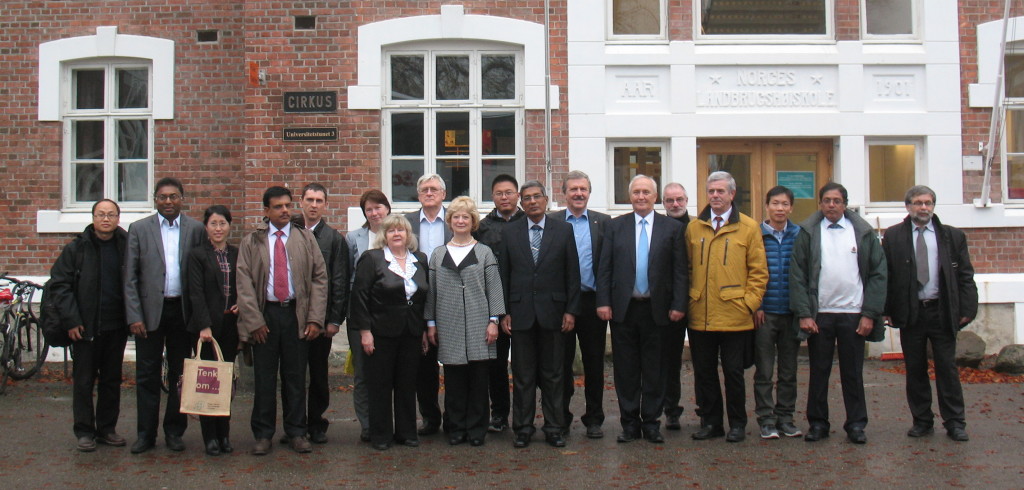Coordinators from collaborating universities met at Norwegian University of Life Sciences for official project inception and planning of further activities.

International team from 10 universities of 6 countries met 5-8 November 2015 to begin the journey for harmonized water related graduate education under the flag of ERASMUS+ EU program. The new project Water Harmony ERASMUS+ (WHE+) will identify and systematically build up methodological and pedagogical approaches supported with tools and resources related to one common and world-prioritized field – water.
WHE+ Project is a unique educational consortia and a good example of building international affairs between countries from different parts of Europe, South and Eastern Asia, creating bridges that overcome geographical gap of more than 8000 km. This is the distance between the farthest partners in the project – coordinating institution Norwegian University of Life Sciences and two universities from Sri Lanka – University of Peradeniya and University of Jaffna. In between the extreme points of project geography there are two European universities – Ostwestfalen-Lippe University of Applied Sciences (Germany) and University of Warmia and Mazury (Poland); three universities from Ukraine – Ukrainian State University of Chemical Technology, National Technical University of Ukraine “KPI” and Cherakssy State Technological University; two universities from China – Qingdao Technological University and Shandong Jianzhu University.
The inaugural project meeting, hosted by Norwegian University of Life Sciences, brought together 20 coordinators representing all project partners. Meeting opening and welcome reception on the day of arrivals was the first time all coordinators met each other personally and exchanged statements on their teaching and research interests, reviewed project application and discussed proposed project structure.

Prof. Harsha Ratnaweera, project manager, introduced the WHE+ with reference to the Program Guide and Application. According to the positive feedback received from the project reviewer, Prof. Ratnaweera gathered the project team based on his long-term professional relations with Sri Lanka and Ukraine, where he studied; China, where he worked before professorship in Norway; Germany and Poland, where he had reliable partners in a number of research projects. Having such advanced and long-term cooperation, the goal of the project emerged as development of improved learning and teaching tools, methodologies and pedagogical approaches using best practices. Thereby partners believe that achievement of the goal will lead to developed skills in multiple use of resources and long-term planning for multiple benefits in such a way that project partners will have harmonised teaching and pedagogical approaches in water related gradual education.
The welcome speech from Prof. Halvor Hektoen, pro-rector of NMBU, started the formal Project Opening on 6th of November in the NMBU historical hall of high-panel meetings. Prof. Hektoen emphasized the importance of the WHE+ project to NMBU referring to its broad international role and the role it can play in NMBUs strategic priorities where excellence in education is in focus. Formal opening continued by self-introduction, where each country presented their universities, participants and their expectations to the project. The formal opening has been summarized by members of the host university – Prof. Cecilie Rolstad Denby, Chair of Department and Prof. Øystein Johnsen, Dean of the Faculty of Environmental Science & Technology.

The project team continued with planning workshops on board the Color Line ferry, travelling from Oslo to Kiel, Germany. Having 6 intensive workshops, the team planned project logistics and tasks through work packages as well as started the first work package on needs analysis. The schedule of activities has been drafted and tasks for the next year agreed.
Resultative WHE+ inception meeting laid the foundation of further success and achievement of the stated goal. It is expected that in this way the project will bring out learning and teaching tools, methodologies and pedagogical approaches and e-learing modules on 6 courses related to water, upgrade laboratories with lab courses and teaching tools. WHE+ staff mobility and workshops will train teachers to think creating better opportunities for graduates and opportunities for contract research and to think multi-purpose utilization of resources. Activities planned during the inaugural meeting will strengthen entrepreneurship skills of students and secure quality assurance of educational programs at the partnering universities.

